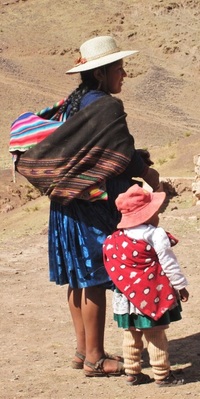“If there is violence in your home, your children are going |

Earlier this year, Tim was working in a rural community that is part of the chagas project when the town’s teacher, Karina, asked to meet with him. She told him about some of the challenges she saw within the community and shared that one of the most significant issues was domestic violence against women and that she could see the impact it was having on her students. Since we were already meeting with the community to do education around chagas and other health issues, Karina asked if it would be possible to do a workshop on violence as well. This past month we were able to follow through on this and launch a pilot workshop in several different rural communities.
In several communities dotting the country side throughout the Chuquisaca region, we've been able to gather men, women, and children together to talk honestly about violence against women. Through indigenous language videos, group activities and conversation we discussed the different forms of violence women face, their causes, its effect on families, ways it can be prevented, and what to do if you or someone you know is suffering violence. Several women and men expressed that it was a release to talk about this taboo issue that has such an impact on their communities.
Kallie built this workshop using research out of Latin America and Bolivia, and through consultation with local health professionals. A few months ago she was able to train a group of young women from a local church on how to facilitate the workshop. She coordinated with one of these ladies, Daniela, who not only accompanied her but took the lead during these resent presentations.
One of our favourite things about CBM’s approach is that we always try to work through and empower others. In addition to Daniela, we had help from Jaime and Felix (two Obades staff who have spent time building relationships with these communities) and Sebastien (a local pastor who serves in this rural area). Not only are important conversations around violence against women taking place in these communities, but there are a growing number of leaders committed to confronting this endemic.
Statistics
A 2014 study by the World Health Organization found that 55% of women admit to suffering physical violence in Bolivia, although this does not include women who decline to share their experience.
A 2015 research study by Red Contra La Violencia estimates that 70% of Bolivian women have experienced violence. Despite this, the report states that in 2014 only about 200 cases were charged: 120 were murders.
 RSS Feed
RSS Feed
